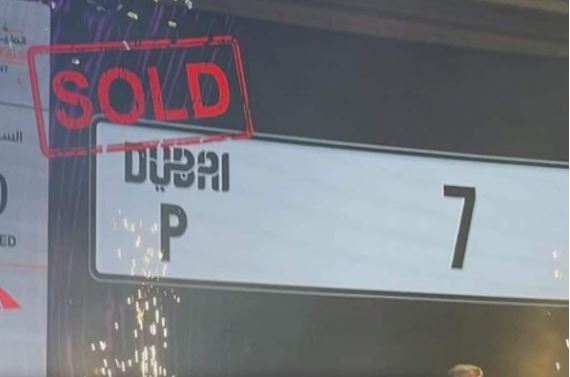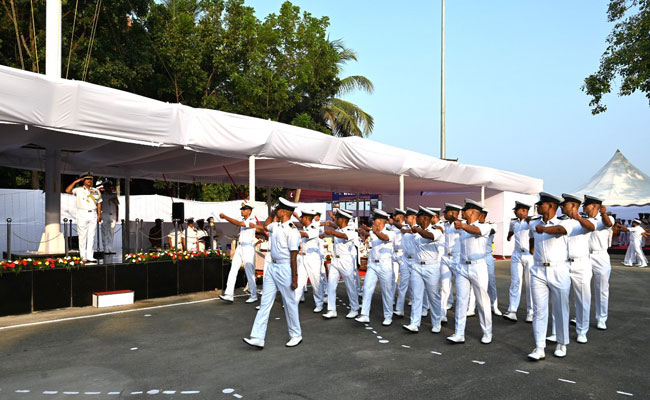Dubai: In Dubai, a rare car license plate has been sold for a world-record price of 55 million dirhams ($15 million or ₹ 123 crore) to a wealthy bidder, breaking the previous record set in the United Arab Emirates over ten years ago. The sale of this highly sought-after license plate has made headlines around the world.
During a charitable auction organized by Emirates Auction LLC, plate number P 7 was sold for a staggering 55 million dirhams ($15 million or ₹ 123 crore) on Saturday. The unique license plate appears to show only the number 7, with the letter P situated off to the side. The auction's proceeds will benefit the 1 Billion Meals Endowment, a global food aid initiative led by Dubai's ruler, Sheikh Mohammed bin Rashid.
Charitable auctions of vanity license plates have become a regular occurrence in the UAE, allowing the ultra-wealthy to display their status and affluence while giving back to the community. The most recent auction shattered the previous record set in 2008 by businessman Saeed Abdul Ghaffar Khouri, who spent 52.2 million dirhams on a license plate featuring the number 1 in Abu Dhabi.
The identity of the individual who paid a staggering 55 million dirhams ($15 million or ₹ 123 crore) for the coveted P 7 license plate remains undisclosed.
Not only in the Middle East, but vanity plates have also commanded exorbitant prices elsewhere. Earlier this year, a single-letter "R" plate was sold at an auction in Hong Kong for an eye-watering price of HK$25.5 million ($3.2 million).
Dubai has long been a haven for the super-rich to showcase their affluence and enjoy a tax-free lifestyle. Despite concerns over economic instability in other parts of the world, the emirate's economy continues to thrive, boosted by high oil prices that also benefit neighboring countries and top customers. The influx of wealth has helped bolster the real estate market, making Dubai an even more attractive destination for the wealthy.
Dubai's relatively low sales tax rates compared to other countries have made it possible for even moderately-paid expats to purchase high-end cars. However, the recent pandemic-related economic upswing has led to a surge in rent prices, putting a strain on middle-class residents.
In 2016, businessman Balvinder Singh Sahni, also known as Abu Sabah, bought the license plate D 5 for 33 million dirhams. In an interview on Monday, he described Dubai as a city of gold, big people, secure people, and nice people. According to Abu Sabah, everyone in Dubai wants to showcase their status and affluence, making these unique license plates highly sought after by the elite.
During an interview, Abu Sabah shared an anecdote about his first visit to the luxury hotel Burj Al Arab in 2006. He was denied entry because his car's license plate had too many numbers. The hotel staff informed him that he would need a two-digit license plate or a reservation to gain entry. Abu Sabah always dreamed of owning a single-digit number plate, and when he had the opportunity to purchase D 5, he went all-in, knowing that the proceeds would go to charity. Being a self-proclaimed numbers guy, he explained that the D 5 plate was an ideal fit for him, as his favorite number is nine. He also pointed out that by adding D (the fourth letter of the alphabet) with five, you get nine.
At the time of reporting, there had been no response from the Guinness World Records to a request for comment.
Unlike some other exclusive license plates, the plate that was sold over the weekend can be transferred to any vehicle registered in the emirate, regardless of whether it's a supercar or not.
Let the Truth be known. If you read VB and like VB, please be a VB Supporter and Help us deliver the Truth to one and all.
Kalaburagi: A dispute over property turned deadly after a man killed his cousin brother using a knife in Kalaburagi’s Sedam taluk late on Friday night.
The deceased has been identified as Basavaraja Talawara (35), a resident of Hanganahalli village.
Basavaraja was involved in a dispute with his cousin, Ghulesh, over the division of family property for some time.
On Friday night, a clash broke out between the duo during which Ghulesh allegedly stabbed Basavaraja with a knife.Basavaraja died on the spot due to severe bleeding, while the accused Ghulesh is absconding, police said.
District Superintendent of Police Addur Srinivasalu, DySP Sangamanath Hiremath and CPI Mahadeva Diddimani visited the crime scene and conducted an investigation.
A complaint has been filed at the Malkheda police station in this regard.





